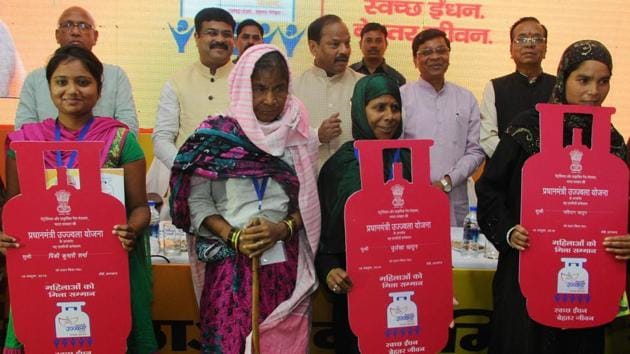The NDA government’s Ujjwala scheme is not a failure
Focusing on a refill-centric analysis to declare the access-centric Ujjwala scheme a failure only two years into its birth is unfair to the initiative of delivering clean fuel to the poor in the country.
There has been much anxiety in recent times about refilling, or the lack of it, of LPG cylinders among poor households under the Pradhan Mantri Ujjwala Yojana (PMUY). This understanding is driven by the conflation of the idea of access (getting a new LPG connection) with expectations of usage (LPG replacing wood/ dung as the main cooking fuel). The underlying assumption is that access would automatically translate to regular usage, typically about six to eight refills a year.

Three of the biggest barriers to LPG access globally are high upfront costs, lack of an expansive distributorship network and, therefore, a lack of steady supply of cylinders. PMUY is fundamentally an access initiative. It would not have touched the figure of 3.4 crore within 18 months without the loan offer and village-level enrolment camps, which made getting a new connection affordable and convenient.
However, access is only the first step towards regular usage of LPG — it is a necessary but not a sufficient condition to bolster usage. Behaviour change involves the one-time, unfamiliar dot behaviour (new LPG purchase), short-term unfamiliar span (new behaviour during first few weeks/ months of LPG usage) and long-term familiar path behaviour (effortful span behaviour turning into the spontaneous habit over time). Each of this requires different types of intervention — the Ujjwala scheme is primarily tackling the first type of behaviour.
Studies across Asia, Africa and Latin America have shown that in rural, poor communities with access to free fuel (wood, dung, crop residues), the transition to commercial fuels is neither fast nor easy. The cook needs to change the style of cooking, the household head needs to readjust family budget priorities to pay for an LPG cylinder and the family has to adjust to real/ perceived changes in taste and texture of the cooked food.
For ‘process utility’, or advantages during actual usage of the product, LPG has many advantages (it is faster and convenient compared to traditional fuels-based cooking). Again, in terms of the process experience (‘feel good’ stress reliever), LPG is a clear winner over its traditional counterparts.
While awareness campaigns do strengthen behavioural intent to use LPG, people factor in perceived incentives (clean kitchen), disincentives (travel to get refills) and short-term impact (out-of-pocket expenses) more than the long-term health consequences.
Also, there are seasonal disincentives to using LPGs, such as heating energy demands and solid fuel abundance — functions that cannot be met using an LPG. These combine with dips in cash flow for families who are dependent on agricultural income. During such seasons, the household head may have to reallocate current consumption expenses and women’s free labour becomes a cheaper option. So, it is not a surprise that even the richest 10% of India’s rural households depend on solid fuels to meet more than 50% of their cooking energy demand — a phenomenon known as cooking technology stacking. Therefore, the presence of both a mud stove and an LPG in a household does not imply that the access-to-LPG scheme has failed.
Focusing on a refill-centric analysis to declare the access-centric Ujjwala scheme a failure only two years into its birth is unfair to the initiative of delivering clean fuel to the poor in the country.
Shreerupa writes on the UN, WTO, oil politics and energy. She is also a consultant with HPCL.
Abhishek Kar is a PhD candidate at the University of British Columbia in Canada
The views expressed are personal



